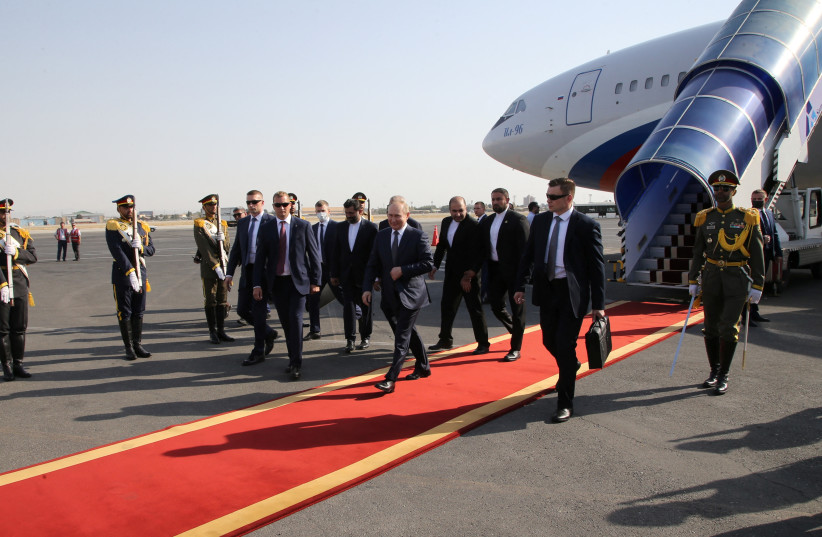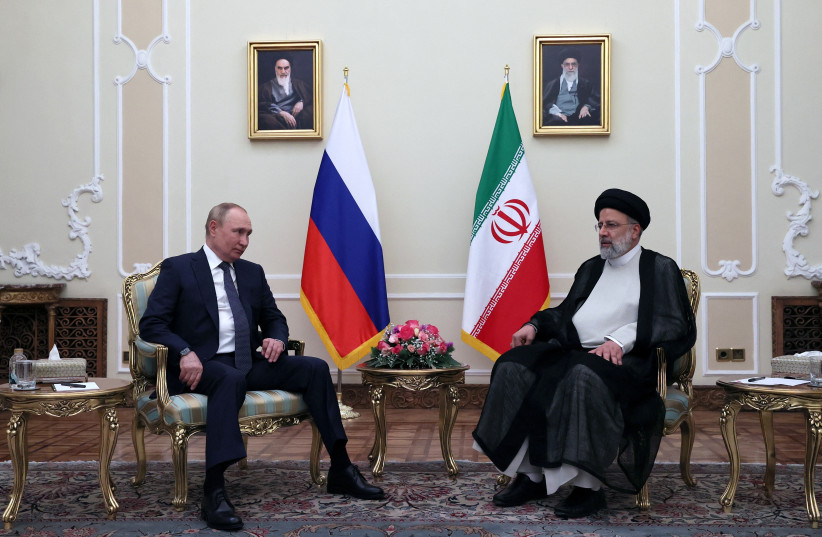by Lahav Harkov
Tehran and Moscow are working together to circumvent the harsh sanctions. Once, Russia helped Iran on that front, now, it goes both ways.
 |
Russian President Vladimir Putin takes part in a welcoming ceremony
at an airport upon his arrival in Tehran, Iran July 19, 2022.
(photo credit: Sputnik/Konstantin Zavrazhin/Pool via REUTERS)
|
Russian President Vladimir Putin’s visit to Tehran on Tuesday is not about Israel, but it comes amid tensions in Russian-Israeli relations. So a meeting with Iranian leaders, who call for Israel’s destruction, could exacerbate the tension.
Those tensions come against the background of the Ukraine war. Prime Minister Yair Lapid, who was foreign minister at the time, condemned Russia’s invasion of Ukraine within days, and Israel voted against Russia in the UN General Assembly. Israel has sent large quantities of humanitarian aid and some protective gear to Ukraine.
At the same time, then-prime minister Naftali Bennett was careful not to criticize Moscow directly, and Israel did not send any military aid to Kyiv, so as not to threaten the deconfliction mechanism that allows Israel to bomb Iranian targets in Syria, where there is a significant Russian Army presence.
In addition, Jerusalem wanted to make sure it could continue to help Russian and Ukrainian Jews who want to immigrate to Israel.
That strategy has had mixed results. The deconfliction mechanism is mostly intact, though Moscow was sharply and publicly critical of a strike on Damascus International Airport last month.

The Russian government is obstructing the Jewish Agency’s efforts to help Russian Jewry move to Israel, labeling the organization a “foreign agent.” Other points of friction, such as Russian remarks against Israel at the UN and disputes over Russian Orthodox Church land in Jerusalem, continue, as well.
Putin’s visit to Iran is also about the war in Ukraine. More isolated than ever, and under massive sanctions from the West, Russia needs all the friends it can get and new markets to sell its wares – especially weapons, since Iran has its own energy sources – and to buy drones.
Putin’s visit is “disconcerting,” Knesset Foreign Affairs and Defense Committee chairman Ram Ben Barak told KAN Reshet Bet.
Israel is “working with the Americans on a regional alliance on economics and security... Iran doesn’t like what’s happening and wants to show who’s in charge,” he said.
The new axis of evil
Russia is sending a message to the entire US-aligned bloc in the Middle East, according to Ksenia Svetlova, director of the Israel-Mideast program at Mitvim.
“This was planned to take place after [US President Joe] Biden’s visit to the region,” she said. “It’s very clear. There is now a US-Israel-Saudi axis and a Russian-Iranian-Belarusian-North Korean axis… the new axis of evil. We should be worried about it.”
“It’s very clear. There is now a US-Israel-Saudi axis and a Russian-Iranian-Belarusian-North Korean axis… the new axis of evil. We should be worried about it.”
Kzenia Svetlova
“Russia will only increase its cooperation with this axis, which will have a direct negative impact on Israel,” Svetlova warned.
An Israeli diplomatic source, citing the drone sales, said while that is not the central goal of the visit – which, ostensibly is about coordinating between Iran, Turkey and Russia in Syria – “more and more things are happening lately that have brought Iran and Russia significantly closer.”
Tehran and Moscow are working together to circumvent sanctions even more than before. Once, Russia helped Iran on that front; now, it goes both ways.
“They are both countries under attack and are forming a coalition,” the diplomatic source said.
There is another view in Jerusalem that finds a silver lining in this alignment, which is that by getting closer with Russia and selling them UAVs, Iran is making it clearer than ever to the West – specifically those European countries that didn’t get the message from Tehran’s malign actions for years throughout the Middle East – that Iran is one of the bad guys.
One aspect of the trip that is of significant concern to Israel is the possibility of Iran purchasing Russian arms.
“Iran is now the only open market for Russian arms,” Svetlova said. “The Iranian media is publishing shopping lists of arms to buy, including systems that are very dangerous for Israel. We wouldn’t want Iran and its proxies using them in Lebanon or Syria.”
In terms of the deconfliction mechanism in Syria, the view in Jerusalem is that it is safe as long as they don’t cross Russia’s redlines, such as by sending weapons to Ukraine that could kill Russian troops.
But Israel will not stop air strikes in Syria because they are vital to national security. Russia understands that ending the deconfliction mechanism will not help them either.
Svetlova, however, said Israel should not be taking the deconfliction mechanism for granted.
“Iran can exact a higher price [for drones and cooperation] because of Russia’s isolation and difficulties in Ukraine,” she said.
At the same time, Svetlova agreed that it is “not in Russia’s interest to make the situation in Syria worse when it comes to Israel. Russia’s primary interest is to keep the calm in this arena and not open another front; they are totally focused on Ukraine.”
When it comes to the Iran nuclear talks, the diplomatic source said Putin’s visit had no significance because the West is no longer interested in involving Moscow after its invasion of Ukraine.
“The Russians helped the Iranians anyway, diplomatically, but they don’t have that ability as much anymore,” he said.
Beyond that, Svetlova and the diplomatic source agreed that the visit by Putin, as well as by Turkish President Recep Tayyip Erdogan, gives Iran problematic public legitimacy.
“Any visit of a leader of a world power to a terrorist country like Iran is dramatic,” Svetlova said. “It gives Iran recognition and self-confidence and raises their international value.”
Lahav Harkov
Source: https://www.jpost.com/international/article-712546
No comments:
Post a Comment